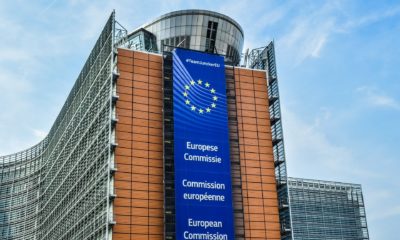Impact Investing
EU Commission Accuses SHEIN of Fake Discounts and Misleading Environmental Claims
The EU Commission and CPC Network notified SHEIN of serious consumer protection violations, including misleading marketing and greenwashing. SHEIN must respond within 30 days or face fines. Investigations cover deceptive practices, lack of transparency, and potential DSA breaches. This marks a critical test of EU digital regulations, emphasizing transparency, consumer rights, and platform accountability.

In a joint and coordinated move at the European level, the European Commission and the Consumer Protection Cooperation (CPC) network today notified Chinese marketplace SHEIN of a series of serious violations of EU consumer protection rules. The allegations include unfair marketing practices, misleading information, lack of transparency in contact and allegedly misleading environmental claims.
The notification, which came after an in-depth investigation conducted by Belgium, France, Ireland and the Netherlands under the coordination of Brussels, requires the e-commerce giant to adapt its operations to EU law. SHEIN now has one month to respond and propose concrete corrections. Otherwise, national authorities may proceed with coercive measures, including fines calculated on the annual turnover in the respective Member States.
“All businesses that serve EU consumers must play by our rules. Today’s action sends a clear message: we will not shy away from e-commerce platforms, no matter where they are located. EU consumer rules are not optional: they must be applied in all cases. I strongly welcome the decisive action taken by the CPC Network. It is now up to SHEIN to step up, play by the rules and fully align its practices with EU consumer rules,” said Michael McGrath, Commissioner for Democracy, Justice, the Rule of Law and Consumer Protection.
The new accusations against SHEIN
The behaviors SHEIN is accused of include false discounts based on unverifiable prices, high-pressure sales techniques with misleading countdowns and timers, lacking or incorrect information on returns and refunds , and the dissemination of alleged sustainability claims without verifiable basis .
Furthermore, the use of misleading labels attributing “added value” to products, when such features are actually required by law, as well as the concealment of contact channels to prevent consumers from receiving assistance , are contested . The investigation also concerns the transparency of product reviews and rankings and the way SHEIN manages contractual relationships with third-party sellers.
The issue of SHEIN’s “misleading environmental claims,” in particular, touches on a sensitive issue for sustainability-conscious investors: the risk of greenwashing and the need for credible certifications along global supply chains.
SHEIN has 30 days to respond to the CPC network’s complaints and propose an action plan . If the company fails to provide satisfactory responses, Member States may initiate national procedures, including the imposition of fines.
The proceedings against SHEIN are in addition to, but not overlap with, the ongoing investigations by the European Commission into the platform’s compliance with DSA rules, with particular attention to the presence of illegal goods, the management of complaints and the promotion of products with potentially harmful impacts on health and well-being.
The context
The action against SHEIN comes at a time of profound regulatory changes in e-commerce. In recent years, the European Union has progressively strengthened its legislative arsenal to respond to the challenges posed by global e-commerce. The package for safe and sustainable e-commerce, presented in February 2025, introduced an integrated vision to ensure the compliance of products placed on the European market throughout their life cycle. Both the General Product Safety Regulation (GPSR) and the Digital Services Act (DSA) fit within this framework.
In this case, the Commission made use of the Regulation on Consumer Protection Cooperation , which allows Member States, together with Norway and Iceland, to conduct joint investigations into potential cross-border infringements .
The CPC Network’s action takes on even greater weight when considering that SHEIN was officially designated, in April 2024, as a “Very Large Online Platform” (VLOP) under the Digital Services Act. This entails stringent obligations such as: assessing and mitigating systemic risks, ensuring the timely removal of illegal content, ensuring algorithmic transparency, and protecting users’ fundamental rights, including those of consumers.
This case represents an important test not only for SHEIN, but for the entire digital commerce ecosystem. European authorities are clearly drawing a red line: platforms operating in the EU market – regardless of their origin – must ensure full transparency, compliance with the rules and fairness towards consumers.
For investors and ESG entities, it is a further sign of the growing attention that the European Union reserves for digital sustainability, the protection of rights and the fight against unfair practices. And above all, a reminder that reputation, in the new regulatory paradigm, is an asset that cannot be overlooked.
SHEIN’s Response
Following the EU initiative, the company responded with the following official statement, received by ESGnews on May 27:
“SHEIN is engaging constructively with national consumer protection authorities and the European Commission to demonstrate its commitment to ensuring full compliance with European Union regulations. We continue to actively participate in this dialogue to address any concerns and contribute to effective solutions. Our priority is to ensure our consumers have a safe, reliable and satisfying online shopping experience.”
__
(Featured image by appshunter.io via Unsplash)
DISCLAIMER: This article was written by a third party contributor and does not reflect the opinion of Born2Invest, its management, staff or its associates. Please review our disclaimer for more information.
This article may include forward-looking statements. These forward-looking statements generally are identified by the words “believe,” “project,” “estimate,” “become,” “plan,” “will,” and similar expressions. These forward-looking statements involve known and unknown risks as well as uncertainties, including those discussed in the following cautionary statements and elsewhere in this article and on this site. Although the Company may believe that its expectations are based on reasonable assumptions, the actual results that the Company may achieve may differ materially from any forward-looking statements, which reflect the opinions of the management of the Company only as of the date hereof. Additionally, please make sure to read these important disclosures.
First published in ESG NEWS. A third-party contributor translated and adapted the article from the original. In case of discrepancy, the original will prevail.
Although we made reasonable efforts to provide accurate translations, some parts may be incorrect. Born2Invest assumes no responsibility for errors, omissions or ambiguities in the translations provided on this website. Any person or entity relying on translated content does so at their own risk. Born2Invest is not responsible for losses caused by such reliance on the accuracy or reliability of translated information. If you wish to report an error or inaccuracy in the translation, we encourage you to contact us.

-

 Markets3 days ago
Markets3 days agoRice Market Slips as Global Price Pressure and Production Concerns Grow
-

 Crypto2 weeks ago
Crypto2 weeks agoBitcoin Wavers Below $70K as Crypto Market Struggles for Momentum
-

 Biotech9 hours ago
Biotech9 hours agoInterministerial Commission on Drug Prices Approves New Drugs and Expanded Treatment Funding
-

 Africa1 week ago
Africa1 week agoMorocco’s Tax Reforms Show Tangible Results




















